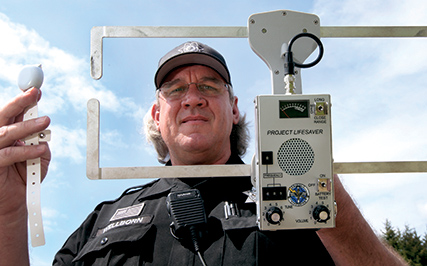Tribal Government & News
Project Lifesaver helps track people with brain ailments who wander

There aren't many people signed up for local chapters of Project Lifesaver, but parents, children, spouses or caretakers of a person with Alzheimer's, autism or any traumatic brain injury could find it to be a huge relief if their relative walks off.
With this program, they will likely be found within minutes.
Grand Ronde Tribal Police Officer Ron Wellborn, who brought the program to Yamhill County in 2007 when he worked for the Sheriff's Office, now has brought it to Grand Ronde.
"It's just one of the best programs around for finding persons who wander," Wellborn said. "Nationwide, since 1999 (first year for Project Lifesaver), the program has logged over 2,800 searches and all have been successful."
The genesis for the local program came in Yamhill, where "a little boy went lost," said Wellborn. "He was autistic. Luckily, we found him. He was in the middle of a creek and OK."
Afterward, Wellborn remembered hearing about Project Lifesaver at a Washington State Search and Rescue Conference. He called the program's main office and asked why Oregon didn't have the service.
"They said, 'No one asked.' "
So, he asked.
The program involves a location transmitter watch that the client wears and a receiver generally staffed by a police agency. Every month, Project Lifesaver personnel visit clients and replace the watch batteries.
The program cuts time and personnel required "drastically," said Wellborn. The time is cut to minutes and personnel can be limited to two officers -- one to drive and another to operate the equipment.
Wellborn is statewide coordinator for the program and a national instructor. He has held the two-day training sessions - an online course and field training - all over the United States. Part of the training, he said, describes background information about how people with different disorders may act.
Alzheimer's patients may try to go to their childhood home, he said. With short-term memory gone, they can start in a direction they think leads to home even though that home may be long gone or far off.
Usually, whatever the intention, clients are still close to their current home when Project Lifesaver swings into action.
One that Wellborn recently found, an autistic boy, was hiding in the bushes outside of a store.
Some people wander off because they think they have done something wrong or because they are in a place they don't want to be.
The program works with a clientele that meets certain criteria, Wellborn said. Those that might not fit the program could have a discipline problem not related to any physical or brain status issue. It may be that the potential client can't keep the band on or cuts it off intentionally.
The Yamhill County Sheriff's Office now has about 20 clients, including two who joined in the last month. Others have since passed on or moved away. The county unit has responded to 12 calls with successful finds in less than 20 minutes in every case, faster than the national average of 30.
With a grant from the federal Department of Justice, the Grand Ronde Police Department has purchased two receivers and four transmitters. The local program is looking for its first client.
Wellborn also started an airborne program for Yamhill County when the department had its own helicopter and police officers trained to fly them. To get that part of the program going in Grand Ronde, Wellborn said, he is looking for a company that will donate airtime for searches. The airborne program is growing across the country.
A newer addition is the PAL (Protect and Locate) Program, an Internet-based system that works with cell phones and GPS.
To get someone into the program, contact the local police department. In Grand Ronde, Wellborn's phone number is 503-879-1822.
